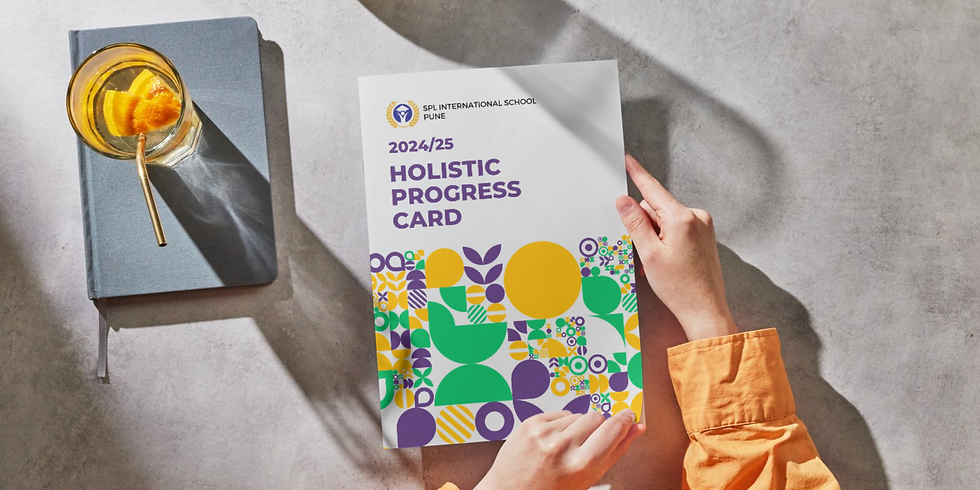Measuring What Truly Matters: The Role of Holistic Progress Card in K-12 Education
- scratchpad Labs
- Jan 22
- 4 min read

Introduction
Have you ever looked at a student's report card and thought, "Is this the full picture of their potential?" Traditional report cards give us a snapshot—mostly grades, percentages, and test scores. But what about resilience? Leadership? Creativity? Emotional intelligence? These are skills that shape not just great students but great humans.
A holistic progress card fills this gap. They take the focus from only academic results to a broader understanding of a child's growth, be it academically, emotionally, socially, or creatively. In a world where adaptability and emotional intelligence are as important as math scores, isn't it time our assessments reflected that?
Let us dive into why holistic progress cards are not just another educational buzzord but a necessity for modern education systems.
A holistic progress card is not the same as the evolved report card—it is the way of thinking. Rather than simply focusing on "What is the grade they received on the math test?" a more significant question needs to be asked like: How well are they collaborating with their peers? How are they managing failure? Is there a show of growth toward emotional regulation, particularly empathy?
Fundamentally speaking, holistic progress cards measure:
Academic Achievement: Yes, grades still matter. They are weighed against effort, improvement, and participation.
Emotional Intelligence: Empathy, self-awareness, and stress management are weighed.
Social and Leadership Skills: Can the student work with a team? Is he confident in presenting ideas?
Creativity and Innovation: Original thinking, problem-solving, and curiosity.
A 2021 UNESCO Global Education Monitoring Report stressed that education systems must shift from narrow academic assessment to better prepare well-rounded individuals for real-world challenges (UNESCO, 2021, https://unesdoc.unesco.org/ark:/48223/pf0000379875).
The Problem with Traditional Report Cards
Let us face it—traditional report cards were designed for a different era. They were built to measure students against rigid academic benchmarks. But today's world demands more.
According to the World Economic Forum Future of Jobs Report (2020), the skills required most by employers are problem-solving, creativity, and emotional intelligence. Such skills, however, find very little space on the traditional report cards.
Imagine this: A student scored poorly in maths but excelled in teamwork, problem-solving, and leadership during a school project. Traditional assessments would brand this student "underperforming," but a holistic progress card would spotlight academic strength points while identifying areas needing improvement.
Stories of the Real World: Schools at the Helm Finland's Holistic Education Model
Finland is a global leader in education and has incorporated holistic assessment methods for a long time. The students are not only assessed based on their academic performance but also on their emotional and social development. The Finnish National Agency for Education research shows that this balanced approach contributes to better student well-being and long-term success (FNBE, 2022, https://www.oph.fi/sites/default/files/documents/Education%20in%20Finland%20-%202022.pdf?utm_source).
The Greenfield Academy Case Study (USA)
Greenfield Academy avoided the old grading system in California by adopting a holistic progress card approach. Two years down the line, teachers responded with:
Engagement of the students
Better relationships between parents and teachers
A report by EdSurge showed that parents felt involved and informed of their child's progress in general and not just on academic grounds (EdSurge, 2021, https://www.edsurge.com/news/2020-12-22-things-fall-apart-will-public-education).
Why Should School Leaders Adopt Holistic Progress Cards?
As a school principal or director, your role is to prepare students for the future—not just the next exam. Holistic progress cards offer several benefits:
Deeper Student Engagement: When students see their progress measured across academics, social skills, and emotional intelligence, they feel more motivated.
Informed Interventions: Teachers better understand where each student thrives and where they need support.
Better Parent-Teacher Communication: From "your child scored 78% in science" to "your child demonstrates great leadership skills but requires help in time management."
A Harvard University study has proven that holistically graded students reported higher engagement and resilience in schools and outside (Harvard PEAR Institute, https://www.pearinc.org/holistic-student-assessment?utm_source).
Steps to Implement Holistic Progress Cards in Your School
Embarking on holistic assessment might seem a hassle, but it can be done with careful steps:
Start with Training: Equip the teachers with tools and knowledge for assessing social, emotional, and academic aspects.
Choose the Right Framework: There is no one-size-fits-all model. Choose a holistic progress card template that aligns with your school's vision.
Collaborate with Parents: Keep the parents informed about the transition and help them understand the value of this new approach.
Monitor and Adjust: Gather regular feedback from teachers, students, and parents to fine-tune your approach. Those schools that have used this blueprint report having smoother transitions and better outcomes.
A Future-Ready Education System
Holistic progress cards are not just about a better report card but about better futures. They prepare the student for a world where emotional resilience, collaboration, and creative problem-solving are as essential as traditional academic knowledge.
Conclusion
Holistic progress cards are not a luxury—they are a necessity in today's rapidly evolving educational landscape. As school leaders, the responsibility falls on you to lead this change.
Ready to change your school's assessment system? Book a Consultation Today and let's create a future-ready assessment framework together.




Comments